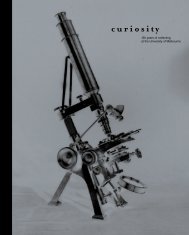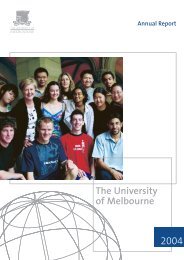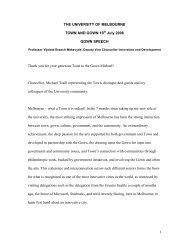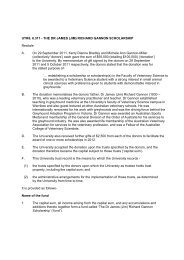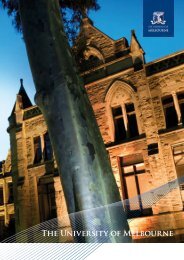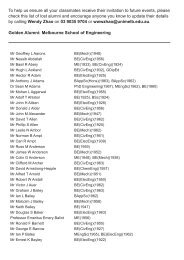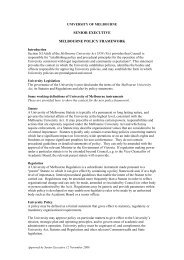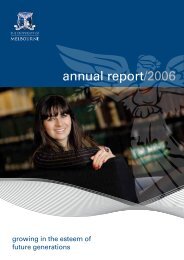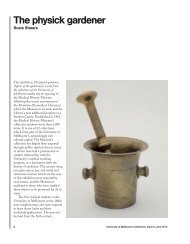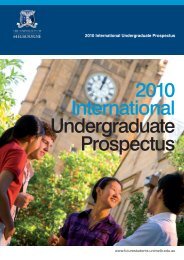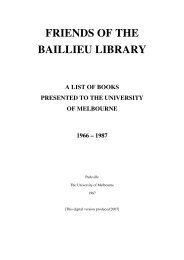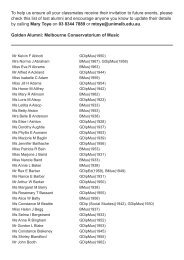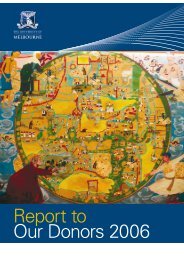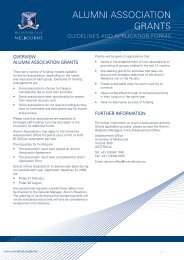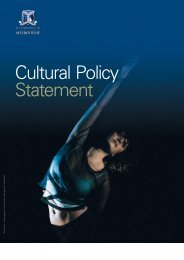2007 Annual report (PDF 8.1 Mb) - University of Melbourne
2007 Annual report (PDF 8.1 Mb) - University of Melbourne
2007 Annual report (PDF 8.1 Mb) - University of Melbourne
Create successful ePaper yourself
Turn your PDF publications into a flip-book with our unique Google optimized e-Paper software.
LEARNING &<br />
teACHING<br />
In 2006 the <strong>University</strong>’s Curriculum<br />
Commission worked closely with faculties<br />
to review the existing curricula, define the<br />
core elements <strong>of</strong> the <strong>Melbourne</strong> Model and<br />
devise a 10-year transition plan Learning<br />
and teaching priorities in <strong>2007</strong> focussed<br />
on implementing the recommendations <strong>of</strong><br />
the 2006 Curriculum Commission Report<br />
for the transition to the <strong>Melbourne</strong> Model,<br />
and on making the administrative reforms<br />
necessary to implement the Model in 2008.<br />
Improvements to the <strong>University</strong>’s physical<br />
infrastructure and student management<br />
systems to support learning, and the<br />
internationalisation <strong>of</strong> academic programs<br />
to promote international awareness and<br />
openness to cultural diversity were also key<br />
strategic aims.<br />
New Generation<br />
Undergraduate Degrees<br />
Strategic Priorities<br />
> Approve the structure and content <strong>of</strong> New<br />
Generation undergraduate degrees<br />
> Define strategies and programs by<br />
the faculties for the transition to the<br />
<strong>Melbourne</strong> Model and incorporate these<br />
into Business Plans<br />
> Define majors and capstone subjects for<br />
New Generation undergraduate degrees<br />
> Define content and criteria for breadth<br />
component <strong>of</strong> New Generation<br />
undergraduate degrees and development<br />
<strong>of</strong> breadth subjects and subject sequences<br />
Achievements<br />
Following the Curriculum Commission’s<br />
comprehensive review <strong>of</strong> the <strong>University</strong>’s<br />
programs in 2006, in March <strong>2007</strong> the<br />
Academic Board approved six New<br />
Generation undergraduate degrees<br />
in Arts, Biomedicine, Commerce,<br />
Environments, Music and Science based<br />
on a recommendation by the Interim Board<br />
<strong>of</strong> Undergraduate Studies (IBUGS) that<br />
the new degrees fulfilled the <strong>University</strong>’s<br />
expectations for the <strong>Melbourne</strong> Model.<br />
During <strong>2007</strong> the structure and content <strong>of</strong> the<br />
new undergraduate degrees was developed<br />
in preparation for their introduction in<br />
2008. Course Standing Committees<br />
for each <strong>of</strong> the degrees consulted with<br />
participating faculties to develop detailed<br />
course proposals and business cases for<br />
the transition to the <strong>Melbourne</strong> Model.<br />
Breadth subjects and subject sequences, as<br />
well as majors and capstone subjects were<br />
developed for each degree.<br />
Breadth subjects are academic subjects that<br />
students can select from outside their major<br />
study areas and are an important feature <strong>of</strong><br />
the new degrees. They may be <strong>of</strong>fered<br />
by more than one faculty and are designed<br />
to build multiple competencies in students<br />
by exposing them to different ways <strong>of</strong><br />
understanding through cross-disciplinary<br />
learning and teaching. <strong>University</strong> breadth<br />
subjects are taught by multiple faculties<br />
and available to all students in all courses.<br />
Eleven <strong>University</strong> breadth subjects will<br />
be available in 2008. The breadth subject<br />
Catastrophes, Cultures and the Angry Earth,<br />
for example, draws on academic expertise<br />
from a range <strong>of</strong> disciplines including history<br />
and engineering to examine how society<br />
interprets natural disasters and what this<br />
tells us about our relationships with religion,<br />
science and technology.<br />
Capstone activities, bringing together the<br />
various strands <strong>of</strong> students’ undergraduate<br />
education and preparing them for life as<br />
graduates, have also been incorporated into<br />
each <strong>of</strong> the New Generation degrees. The<br />
New Generation Bachelor <strong>of</strong> Commerce,<br />
for example, <strong>of</strong>fers a range <strong>of</strong> capstone<br />
experiences for students completing<br />
their final year <strong>of</strong> undergraduate study<br />
through subjects <strong>of</strong>fering work experience<br />
opportunities and exposure to local and<br />
international industry practitioners.<br />
Entry to <strong>Melbourne</strong><br />
Model Degrees<br />
Strategic Priorities<br />
> Re-examine selection criteria for New<br />
Generation undergraduate degrees (for<br />
2010 entry) and graduate degrees (for<br />
2008 entry)<br />
> Define pathways into undergraduate<br />
and postgraduate courses for students<br />
returning to study<br />
> Approve the structure and content <strong>of</strong><br />
new pr<strong>of</strong>essional graduate courses<br />
> Establish and approve appropriate<br />
guaranteed pathways to pr<strong>of</strong>essional<br />
graduate courses<br />
Achievements<br />
Processes to facilitate admission and<br />
accessible pathways into the new<br />
undergraduate degrees were put in place in<br />
<strong>2007</strong>. A policy defining non-school leaver<br />
admissions pathways under the <strong>Melbourne</strong><br />
Model was also developed, promoting<br />
selection into undergraduate programs<br />
for non-school leavers and establishing<br />
appropriate processes for assessing the<br />
prior learning and current skills <strong>of</strong> nonschool<br />
leavers.<br />
Faculties also continued to define<br />
the content and selection criteria for<br />
graduate degrees commencing in 2008.<br />
Requirements for guaranteed entry <strong>of</strong><br />
school leavers into graduate pr<strong>of</strong>essional<br />
degrees such as the Juris Doctor were<br />
confirmed by the Academic Board, along<br />
with a policy for attracting and recruiting<br />
high-achieving secondary students.<br />
A strategy was adopted for resolving<br />
whether degrees will <strong>of</strong>fer an honours year<br />
or a two-year masters pathway.<br />
Make the necessary<br />
administrative reforms so<br />
that the <strong>Melbourne</strong> Model<br />
can be implemented in 2008.<br />
Expert leadership during a period <strong>of</strong><br />
significant change is imperative. A<br />
new executive committee structure<br />
was established in <strong>2007</strong> to meet the<br />
administrative requirements <strong>of</strong> the<br />
<strong>Melbourne</strong> Model – undergraduate degrees<br />
managed on behalf <strong>of</strong> the <strong>University</strong>, a<br />
graduate school model <strong>of</strong> pr<strong>of</strong>essional<br />
education, cross-faculty graduate programs<br />
and a more consistent and studentfocussed<br />
delivery <strong>of</strong> services.<br />
GRADUATES IN FULL-TIME EMPLOYMENT<br />
%<br />
100<br />
80<br />
60<br />
40<br />
20<br />
0<br />
40<br />
35<br />
30<br />
25<br />
20<br />
15<br />
10<br />
5<br />
0<br />
2002 2003 2004 2005 2006 <strong>2007</strong><br />
<strong>University</strong> <strong>of</strong> <strong>Melbourne</strong><br />
Other Victorian institutions (average)<br />
Other Australian institutions (average)<br />
GRADUATES IN FULL-TIME STUDY<br />
2001 2002 2003 2004 2005 2006<br />
<strong>University</strong> <strong>of</strong> <strong>Melbourne</strong><br />
Other Victorian institutions (average)<br />
Other Australian institutions (average)<br />
Data shows % <strong>of</strong> total graduates<br />
The <strong>University</strong> <strong>of</strong> <strong>Melbourne</strong> <strong>Annual</strong> Report <strong>2007</strong> 33



